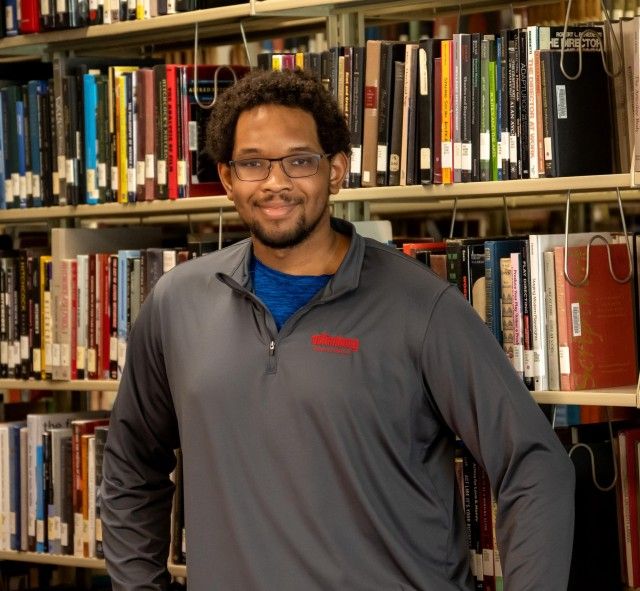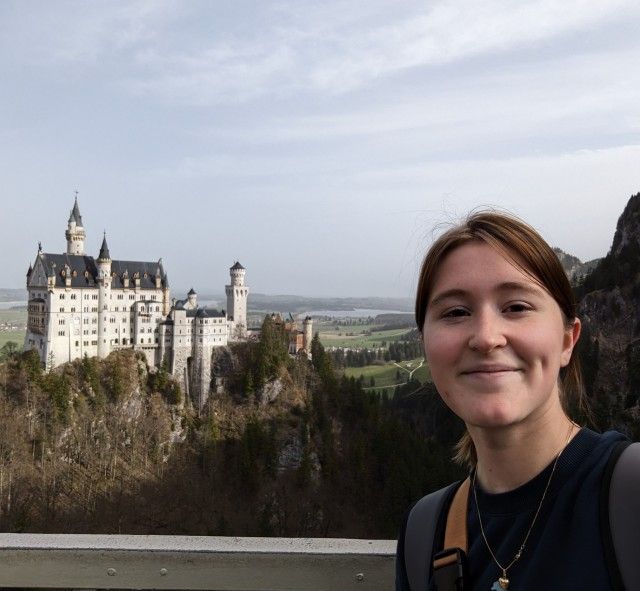Collegium Award
The Collegium Award for Excellence and Innovation in Teaching was recently presented to two faculty members by Wittenberg’s Faculty Development Board (FDB). The 2022 recipients are Erin Hill, assistant professor of practice in the Education Department, and Danny Marous, assistant professor of chemistry.
The Collegium Award is an annual award that recognizes outstanding teaching as well as a faculty member’s commitment to growing and improving as a teaching scholar. It is the only teaching award at Wittenberg that is awarded by the faculty itself. Any faculty member who has taught at Wittenberg for at least three years is eligible for this award.
Hill came to Wittenberg in 2018 after 20 years of teaching high school English. As an experienced practitioner, she has demonstrated passion, creativity, organization, and hard work in her teaching since joining Wittenberg. Student evaluations sing the highest praise almost unanimously and in every category. One faculty peer evaluator commented that “Erin’s class left me inspired and energized because of the intentionality of her discussion plans and her willingness to walk the tightrope of letting students discover all the things she wants them to discover as they do their work. She gives each student space to share things with her, whether about the class or about their lives. I observed a teacher at the top of her game."
Marous has been at Wittenberg since 2017 and thoughtfully engages his students with creative, interactive chemistry lessons. Student evaluations echo the highest possible praise consistently over his career and in every category. One student commented that “despite this class being at 8 a.m., I look forward to coming here every day. Dr. Marous makes learning interesting and fun, so I enjoy being here. This is by far my favorite class this semester.”
One peer evaluator concluded that “Dr. Marous has built an instructional environment that is highly conducive to learning…there was constant participation… the class session was designed to capture and maintain students’ attention…This is the best class I have ever been a part of as a student, instructor, or peer evaluator. Dr. Marous did so many things well that I am one in awe and two self-conscious about my own teaching."
Edith B. and Frank C. Matthies Award
Also, upon the recommendation of the FDB, Kelly Dillon, associate professor of communication and digital media, has been chosen to receive the 2022 Edith B. and Frank C. Matthies Award.
The purpose of this award is “to further the education of selected and worthy teachers and to strengthen the faculty.” FDB felt Dillon’s “innovative teaching that benefits students and our community by educating herself and others in the technology of Rocketbook notebooks for use in her classroom” merits this award.
Dillon teaches courses in media studies, communication technology, and public speaking. Her work focuses on computer-mediated communication, specifically how users decide to intervene in online events like cyberbullying, hate speech, and need for social support. She has presented her work at International and National Communication conferences, and in the journal Computers in Human Behavior.
Pi Sigma Alpha James Lengle Advisor Recognition Award
Rob Baker, professor of political science, was recently presented with the 2022 Pi Sigma Alpha James Lengle Advisor Recognition Award. This award honors his 34 years of service as Faculty Advisor to the Alpha Xi chapter at Wittenberg University, where he has helped induct more than 300 members.
The health and success of an honor society depends almost entirely upon the dedication and energy of the faculty members who serve as chapter advisors and that many advisors face the challenge of keeping balance among teaching, research, and other commitments.
Named after James Lengle, who served as executive director of the Pi Sigma Alpha office and as faculty advisor to Georgetown University's PSA chapter, the award was instituted to show the organization’s appreciation of the advisors who have shown exceptional dedication to their chapters and student members.
The Lengle Advisor Recognition Award includes prize money, a certificate of appreciation and promotion on social media channels and in Political Science Today, the American Political Science Association's new magazine.
Baker has taught at Wittenberg since 1987. In 2010-11 he served as the Interim Faculty Director for the Hagen Center for Civic and Urban Engagement, and the Director of Community-Based Research at the Hagen Center from 2011-2013. He chaired the Department of Political Science from 1996-2003, and was Director of the Urban Studies Program from 1994-1996. He is the recipient of the 2011 Alumni Award for Distinguished Teaching, the 1990 Omicron Delta Kappa Award for Excellence in Teaching, and the 2012-2013 and 2005-2006 Melvin Latch Faculty Scholar Award.
Moves, Changes, and Appointments
Kristin Cline, the inaugural holder of the John W. Barker Chair in Chemistry, is now the new director of general education.
Cline joined the Wittenberg faculty in September of 1993 and has since made significant contributions to the campus community. In addition to having served her department as chair for 11 years, she has also been on both the Educational Policy Committee (EPC) and the General Education Committee.
Furthermore, she has substantive experience with the assessment of student learning, having now served on the Program Review and Assessment Committee (PRAC) for three years, including two semesters as chair. Prior to the creation of PRAC, she also served two terms on the Assessment of Student Academic Achievement Committee, and co-led the criterion 4 subgroup for our 2015-2016 HLC accreditation team, which focused on teaching and learning/evaluation and improvement. Since assessment is a crucial component of the director’s responsibilities, she is well-prepared to take on this role.
Alejandra Gimenez-Berger, associate professor of art, became the director of the Honors Program beginning with the academic year 2022-23. Gimenez-Berger brings substantive experience in teaching honors seminars (seven different ones, some more than once) and has served as the primary advisor for 11 honors theses and as secondary advisor for another 15.
Gimenez-Berger has number of goals that she would like to pursue in collaboration with Beth Hallauer, assistant director of the University Honors Program. These goals focus on mission and assessment, consistency of expectations across the academic program, enhancing the visibility of the Honors Program on campus and with prospective students, and identifying additional funding sources for the program.
Thomas Taylor, professor of history, was recently appointed by the chancellor of the Ohio Department of Higher Education, to serve on the P-16 Initiatives Ohio Educator Standards Board (ESB) for the Ohio Department of Education. Taylor is one of three representatives from higher education to the board.
According to its website, the Ohio Department of Education is a diverse team of passionate, education-focused professionals dedicated to fulfilling the vision established in Each Child, Our Future, Ohio’s strategic plan for education. Under the leadership of the superintendent of public instruction and governed by the State Board of Education, department team members, in collaboration with a wide range of partners, are focused on helping schools and districts continually improve to be the best they can be while ensuring this vision for each of Ohio’s 1.7 million students, in partnership with more than 240,000 educators across the state equity and impact are core to every program, service and action. The department’s work is well regarded both in Ohio and nationally for its innovative, leading-edge, and forward-looking approach. When the department succeeds, students succeed, communities succeed, and Ohio succeeds.
The ESB, which develops and recommends to the state board of education standards for entering and continuing in the educator professions and standards for educator professional development, consists of 19 members including 10 employed as teachers in Ohio school districts, one chartered non-public school, five school administrators, a board of education member, one parent, and one person representing community schools. Then the chancellor appoints three persons employed by institutions of higher education that offer educator preparation programs. Taylor fulfills the role of being employed in a college of college of arts and sciences and will serve a two-year term.
New Book on Demonic Bodies
Travis W. Proctor, assistant professor of religion and director of premodern and ancient world studies (P.A.S.T.) program at Wittenberg, recently published a book, Demonic Bodies and the Dark Ecologies of Early Christian Culture, exploring comparative demonology across the first three centuries of Christian history, including both biblical and non-biblical texts, as well as texts in Greek, Coptic, and Latin. This is the first book-length study of conceptions of nonhuman bodies in early Christian literature. Travis explains how contemporary critical theories such as gender studies, environmental humanities, and disability studies can contribute to study of religion and history of Christianity. He recently did an interview with the New Books Network podcast.
Standing Up to POTS
Standing Up to POTS, founded by Cathy Pederson, biology professor at Wittenberg, is hosting the 9th Annual Standing Up to POTS 5K/2K on Saturday, Oct. 22, beginning at 11 a.m. in front of the Benham-Pence Student Center. The major fundraiser for her organization, the campus event has raised $86,546.35 for POTS research since 2015. There are several ways to participate in the 9th Annual Standing Up to POTS 5K/2K:
- Register to walk or run either in person or virtually: https://www.standinguptopots.org/annual-5k
- Donate to help fund POTS research: https://www.standinguptopots.org/donate
- Help find and register event sponsors: https://www.standinguptopots.org/sponsorship-form
“We have increasing numbers of students, including my daughter, the reason I do all of this, with postural orthostatic tachycardia syndrome (POTS) on campus,” Pederson said. “These students often have a myriad of symptoms that ebb and flow with the weather, stress, physical and mental exertion, and require accommodations to be successful. The good news is that these students are often both bright and motivated, despite their health issues. We are so proud to have faculty, staff, and students out there supporting the POTS community in this event every year.”
A few facts about POTS:
- POTS is a neurological disorder that causes a malfunction of the autonomic (automatic part) nervous system. This dysfunction includes issues with heart rate, blood pressure, movement of food through the digestive tract, control of pupil diameter, and blood flow issues resulting in headaches, dizziness and fainting.
- 70 million people are estimated to have POTS globally. POTS is a part of long-haul COVID, and, unfortunately, we are adding new members to this community every day.
- Up to three million POTS patients in the U.S.
- Approximately one percent of teens are thought to have POTS
- 25 percent of POTS patients are too sick to work or go to school
A few facts about Standing Up to POTS:
- Founded in 2014, it has awarded $318,684 in research grants to top POTS physicians in the United State, Canada, Germany, Sweden, and Australia. Most of that money has come from private donors.
- In 2021, The POTScast, a podcast for families impacted by POTS was launched to provide information on the basic science of POTS, interview POTS practitioners, and share the stories of current POTS patients. In just over a year, it has more than 153,000 listens/downloads.
- The organization runs support groups for POTS patients and their families on Facebook.
Pederson has recently been in the news being interviewed on NPR and Newscast. You can also read the accompanying Newscast article here.
The above information was compiled by Cindy Holbrook.







